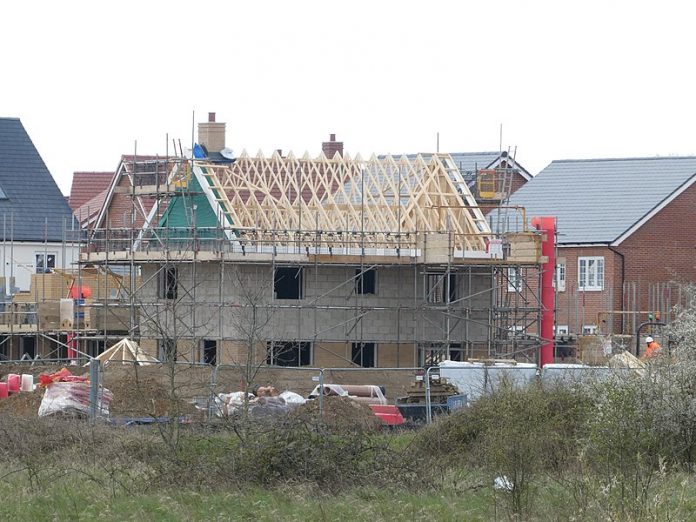The administration of President Joe Biden withdrew a previously approved permit that is necessary for the construction 28,000 new homes in fast-growing Arizona.
The U.S. Army Corps of Engineers (Army Corps) decision to suspend what is known as a dredge-and-fill permit under section 404 of the 1972 Clean Water Act (CWA) reverses the agency’s 2017 approval of the permit.
The permit allowed the discharge of dredged material into streams, desert washes, and wetlands considered “waters of the United States” under the CWA. The permit was essential for the construction phase of the Villages at Vigneto housing development.
Opponents of the project, including the Arizona-based Center for Biological Diversity, requested the Army Corps rescind the permits, contending that pumping groundwater to the homes would endanger the nearby San Pedro River, including parts of a national conservation area and wetlands at St. David Cienega.
In environmental impact assessment filed when the permits were originally issued the developer, El Dorado Benson LLC, had agreed to compensate for filling washes on 51 acres at the site by carrying out mitigation measures to enhance 144 acres along the west bank of the San Pedro River.
With the permits suspended, the developer is barred from doing any work on the 12,000-acre site, located near Benson, about 45 miles east of Tucson.
Change of Assessment
The possibility that the development might lose it permits first arose when Jeffry Humphrey, a field supervisor in Southwestern Region of the U.S. Fish & Wildlife Service (FWS) sent a letter to David Castanon, chief of the Regulatory Division, Los Angeles District of the U.S. Army Corps of Engineers, indicating FWS has changed its opinion of the project.
“[FWS] conducted an internal review of the 2017 LOC (letter of concurrence) and the process by which that [permitting] decision was made,” said Humphrey in his June 28 letter. “Pursuant to our review, we are rescinding the 2017 LOC effective immediately.”
The 2017 LOC had determined granting a CWA permit to the Villages at Vigneto “was not likely to adversely affect threatened and endangered species or their critical habitat in the action area.” In his letter to the Corps, Humphrey did not say which threatened or endangered species the agency now believes would be put at risk by the project.
In response to Humphry’s letter, Castanon whose agency shares CWA jurisdiction with FWS, issued a July 1 memo saying it “has determined that it is in the public interest to suspend” the permit.
Circumstances Have Not Changed
With the permit now suspended, because El Dorado Holdings still wishes to move forward with the project, the FWS will be required to undertake a new full biological assessment, a process that could take years.
According to a statement, El Dorado Holdings remains optimistic the Villages at Vigneto will eventually move forward.
“We do not believe the suspension is merited as no facts or circumstances have changed that would warrant such a suspension ….,” said El Dorado Holding’s statement. “The Army Corps of Engineers will reevaluate the circumstances surrounding the permit, as it has done before, and we are confident that it will be reinstated again.
“We look forward to working with the Corps to address any questions that the agency may have,” the company’s statement said.
If the project is ever completed, it will provide homes in a gated community for about 70,000 residents.
Uncertain Property Rights
Contending with myriad local, federal, and state regulations and standards make it difficult to develop one’s property, says Daren Bakst, a senior research fellow at the Heritage Foundation’s Institute for Economic Freedom, but this difficulty is compounded when a change in administration results in a reversal of previous approvals.
“Environmental laws are already hard to comply with because of how vague and subjective they are for property owners,” said Baskst. “But when government officials enforce the laws in an inconsistent manner, and even reverse course, as was done here, it becomes almost impossible for property owners.”
‘Preview of Coming Attractions’
This permit withdrawal may make other property owners question whether attempting to develop their lands are worthwhile, says Bakst.
“In this instance, it is nice to see the development company appears likely try to move ahead with a project that could provide homes for tens of thousands of Americans,” said Bakst. “But for many developers, this type of government change of mind would be enough to kill off the project.
“It certainly would be enough to discourage many property owners from continuing with their own plans, because it sends a signal to property owners that development may not be worth the time and trouble,” Bakst said.
This action was about the Biden administration furthering its effort to implement national land-use control, says Craig Rucker, president of Committee for a Constructive Tomorrow (CFACT), which co-publishes Environment & Climate News.
“This episode shows the Biden administration is willing to use the Clean Water Act, the Endangered Species Act, and anything else they can dig up, to stop the construction of much-needed new homes and other property,” Rucker said. “It’s a preview of coming attractions from an administration committed to putting at least 30 percent of all land and water off limits to any development by 2030.”
Bonner R. Cohen, Ph.D., (bcohen@nationalcenter.org) is a senior fellow at the National Center for Public Policy Research and a senior policy analyst with CFACT.


























